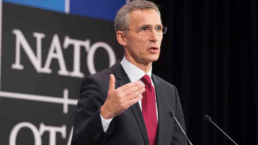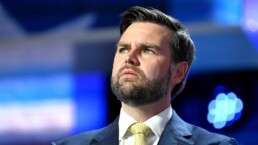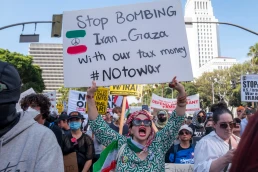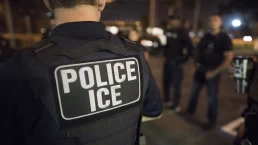In the face of overwhelming evidence about the danger of NATO expansion, how did Western concerns about NATO come to be called Russian propaganda?
By Benjamin Abelow, Z Network
There are two competing narratives about the origins of the Ukraine War.
According to one narrative, Vladimir Putin is a Hitler-like aggressor. He wants to reestablish the Soviet empire by swallowing Ukraine and threatening the Baltic countries, Poland, and the nations further west. This narrative was created by Washington and Brussels. It has been repeated by European leaders and echoed endlessly in the media. If you accept this narrative, you will be lauded as a humanitarian, a virtuous citizen of Europe, the West, and the world.
Israel’s military on Friday ordered 1.1 million civilians in the northern Gaza Strip to evacuate “southwards” in just 24 hours, a demand that aid groups say will cause untold human suffering. The ultimatum comes ahead of an expected ground invasion of the besieged coastal enclave, where authorities say 1,537 people have been killed since Israel began devastating airstrikes in retaliation for a Hamas attack in which militants killed 1,300 people and took some 150 hostages. Hamas says the intense Israeli bombardment that has pulverized much of Gaza also killed 13 hostages. Meanwhile, Israel continues to maintain a total blockade of the territory, blocking food, water, fuel and medicine from reaching those trapped inside. For more on the crisis and mounting human toll, we speak with Gaza writer Muhammad Shehada, who condemns the international community and mainstream media for its complicity in Israel’s destruction of Gaza. “These things are unimaginable horrors that are inflicted on Gaza right now with no one intervening to stop it,” he says. “This is pure madness.”

The other narrative asserts that Putin invaded Ukraine because he perceived a threat from the West—in particular, from the progressive militarization of Ukraine. This narrative has been suppressed by Western governments and derided in the media. If you say that “NATO did it,” you will be called a “stooge of the Kremlin” or “Putin’s puppet.”
Unless you are the head of NATO.
Early last month, speaking to the European Parliament’s Committee on Foreign Affairs, NATO Secretary General Jens Stoltenberg commented on Finland’s recent accession to the Alliance. He took the opportunity to mock Vladimir Putin. In doing so, he made what Columbia University economist Jeffrey Sachs described as a “Washington gaffe.” This meant “that he accidentally blurted out the truth.”
According to Stoltenberg,
“President Putin declared in the autumn of 2021, and actually sent a draft treaty that they wanted NATO to sign, to promise no more NATO enlargement. … Of course, we didn’t sign that. … He wanted us to sign that promise, never to enlarge NATO. … We rejected that. So he went to war to prevent NATO, more NATO, close to his borders. He has got the exact opposite.”
Stoltenberg’s comments were shocking for their honesty, but no one should have been surprised to hear that Putin “went to war to prevent NATO, more NATO, close to his borders.”
Starting in the 1990’s, preeminent diplomats and scholars predicted disaster if NATO expanded toward Russia. Three former U.S. Ambassadors to Moscow—George Kennan (who developed the strategy of “containing” the U.S.S.R.), William Burns (currently director of the CIA), and Jack Matlock Jr (who helped negotiate the end of the Cold War)—all warned against NATO expansion.
Prominent hawks also opposed the expansion of NATO. These include Paul Nitze, author of a secret document, known as NSC 68, that guided U.S. military policy during the Cold War, and Richard Pipes, a crusading anti-communist Harvard professor. In 1997, in an open letter, 40 of the most experienced diplomats, military figures, and scholars in the United States asserted that expanding NATO would be the worst foreign policy disaster of the entire post-Cold War period.
In 2008, just months before NATO offered an “open door” to Ukraine and Georgia, Ambassador Burns wrote the following in a confidential email to the Secretary of State and other senior officials: “Ukrainian entry into NATO is the brightest of all redlines for the Russian elite (not just Putin).” Later in 2008, the U.S. National Intelligence Council concluded that, in offering membership to Ukraine, NATO had created a real risk that Russia might annex Crimea and also invade Ukraine proper. In 2014, the eminent University of Chicago political scientist John Mearsheimer publicly predicted that if U.S. policy toward Ukraine did not change, Russia would “wreck” Ukraine rather than let it become a Western military bulwark on Russia’s border.
So, nobody should have been surprised by what Stoltenberg let slip.
The current war is not only destroying Ukraine but is creating a real and growing risk of nuclear war. That statement is not Russian propaganda. It is based on a new report by the RAND Corporation, a think-tank funded by the U.S. military—about as far from Russian propaganda as one can imagine. In boldface text, the RAND report states, “Further deliberate escalation, including Russian nuclear escalation, is highly plausible.” Such nuclear use “could be surprisingly extensive.” If Moscow does use nuclear weapons, “it may be relatively unconstrained,” possibly using strategic warheads.
In the face of overwhelming evidence about the danger of NATO expansion, how did Western concerns about NATO come to be called Russian propaganda? It did not happen naturally. Rather, we in the West have been victims of what scholars such as Noam Chomsky have termed the “manufacture of consent.” In democracies, elites cannot implement their aims by authoritarian fiat. Instead, they use their tremendous power to manipulate public opinion, creating an artificial consensus to support their chosen policies. Too often, these policies are unbelievably dangerous, cruel, and incompetent. According to a Brown University study, U.S. wars since the 2001 attack on the World Trade Towers have led to the death of over three million people.
There is only one solution to the ongoing disaster in Ukraine. It is not a good one, but it is the best one available: to immediately press for a ceasefire, followed by a negotiated settlement. And we must face reality. Ukraine will not be made whole. Land will be lost, and the dead on both sides will not be revived. The 50,000 Ukrainians who have endured amputations will not regain their limbs. The countless young Russian men who were burned alive in their tanks will not return to their wives, children, and parents. But at least this terrible war will end before things get worse for everyone, or spin entirely out of control.
Putin didn’t have to go to war. But he was pushed to the wall by the elites in Washington and Brussels. Had the situation been reversed—say, if Russia or China had tried to encircle the United States with military bases and practiced launching missiles right on the U.S. boarder, as NATO did in Estonia in 2020 and 2021—Washington would have gone to war, too.
So, no, Mr. Putin is not a paranoid madman. However much one must oppose, detest, and regret the horrific war he unleashed, one also must recognize that Putin did exactly what the U.S. would have done in his situation. Most other countries also would have done the same, assuming they had sufficient military power.
Notwithstanding Stoltenberg’s comments, the foreign policy elites in Washington and the EU appear psychologically incapable of acknowledging the truth. Instead of admitting their errors and taking responsibility for the disaster they created, these leaders will double down, pressing the same narrative even harder. This is what President Biden recently did at the U.N. It is therefore up to the people of Europe, the United States, and the Global Majority—and those leaders of intelligence, integrity, and independent mind—to take the helm and demand an end to this war now.
Benjamin Abelow is the author of How the West Brought War to Ukraine, available in English, German, Italian, Polish, Danish, Slovenian, and Dutch. He previously worked in Washington, DC, on nuclear arms issues. He holds a B.A. in European history and an M.D. from Yale. His other areas of interest include the study of trauma, including war trauma.
Recent Posts
Is A Citizens United 2.0 Right Around The Corner?
July 15, 2025
Take Action Now Is it possible for American democracy to be further degraded by the influence of billionaires? Thanks to champion of the working…
U.S. Leaders Gave Up On Diplomacy With Iran. We Must Make Them Return To It.
July 15, 2025
Take Action Now Building an antiwar movement means preventing the systemic U.S. aggression that creates the conditions for war.By Hanieh Jodat,…
What To Do When You See ICE In Your Neighborhood
July 14, 2025
Take Action Now How can you deter the Trump administration’s immigrant deportation machine when it pops up in your community? Follow these…
ICE Campaign Of Violence Will Lead To More Deaths
July 14, 2025
Take Action Now Jaime Alanis’s death shows the horrific consequences of a secret police force behaving with utter impunity.By Natasha Lennard, The…




